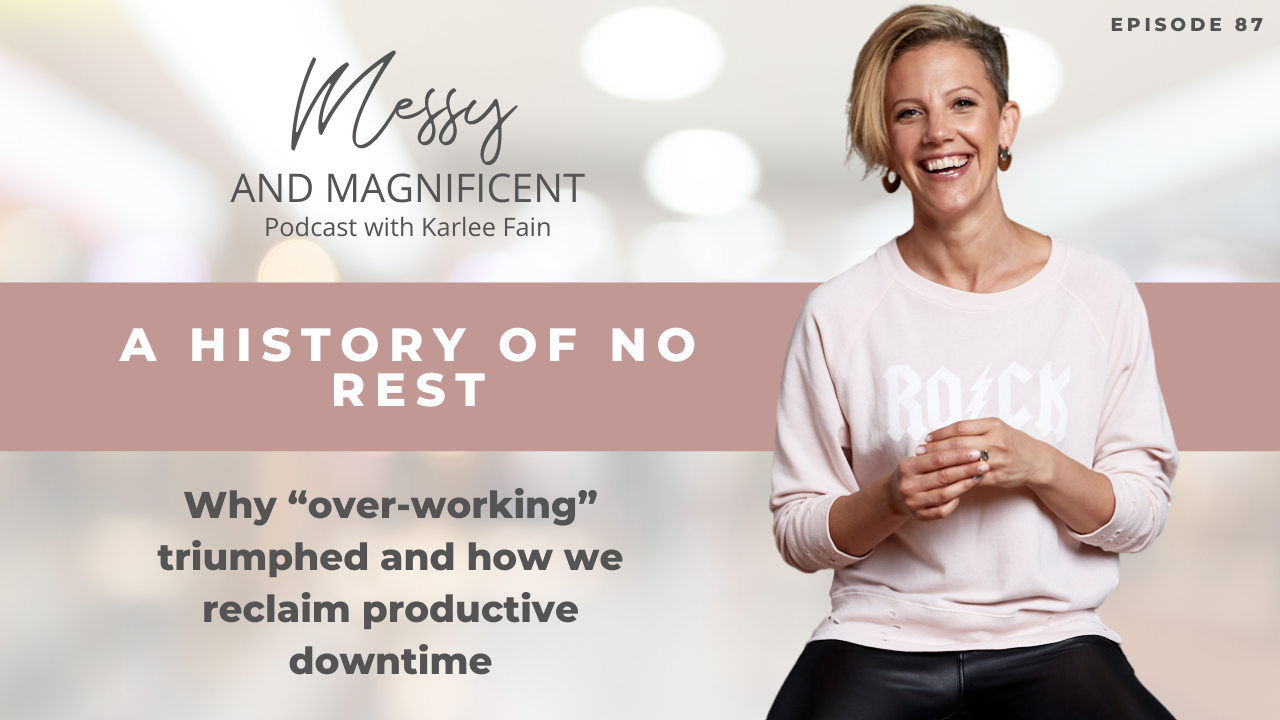Episode 87: A History of No Rest: Why “over-working” triumphed and how we reclaim productive downtime
Jul 05, 2021
What comes to mind when you think of rest?
Is it sipping a pina colada on a beach somewhere? Taking a hot bath, surrounded by richly scented candles? A week-long yoga retreat? Reading a book under the sun in your backyard?
Whatever rest looks like for you, there’s one thing that’s been deeply, culturally ingrained in our minds: If you want to justify time for rest, you have to earn it first.
The typical weekly ratio of work to downtime tells us that 5 days of work earn you 2 days of rest.
But, we all feel it in our bones.... That old narrative about rest just isn’t cutting it.
So why are we STILL working so hard and resting so little?
Our concept of rest comes from the puritans. It’s based around the idea that material success equates to worthiness. Historically, that belief kept people pushing towards salvation because they didn’t want to be damned.
But that’s not our world anymore. We don’t have to continue to abide by those standards.
Know this…
The problem isn’t you. It’s the structure we’ve been indoctrinated into.
In today’s episode, Karlee takes you on a little jaunt through history to uncover the roots of over-work culture. You’ll gain valuable insight into why we don’t value rest in western culture, and how we can flip our very concept of rest into something we can view more accurately as “productive downtime”. Disrupting this idea is the key to understanding not only the value of rest, but it’s also how we make it achievable- and in some cases, even profitable.
Rest allows space for creativity. It’s time to reframe our concept of downtime and place more value on recharging.
It’s time to destigmatize rest.
If you’re ready to reclaim your productive downtime and thrive more wholly in your life and career, then this episode is for you.
What You’ll Learn in This Episode:
- Knowing the difference between hard work and over-working (1:27)
- Making the stimulus + belief = response formula work for you, not against you (13:35)
- Why capitalism ties material success to worthiness (17:30)
- The link between Puritanical values and the gender and racial pay gap (19:12)
- How our work and personal lives became separate (23:43)
- Why more work doesn’t actually equal more productivity (27:02)
People Mentioned in this Episode:
Resources Mentioned in this Episode:
Article: “This Column Will Change Your Life: The Protestant Work Ethic | Burkeman.” The Guardian, Guardian News and Media, 10 Sept. 2010, www.theguardian.com/lifeandstyle/2010/sep/11/pain-gain-work-ethic-burkeman.
Journal: “Worry Isn't Work.” Harvard Business Review, 23 July 2014, hbr.org/2010/08/worry-isnt-work.html.
Article: Elissa Sangster, “The Patriarchy Invented The 9-5 Workday. Here's How We Remake It With Women In The Room.” Forbes, Forbes Magazine, 10 Sept. 2019
Article: “What's Really Holding Women Back?” Harvard Business Review, 19 Feb. 2020, hbr.org/2020/03/whats-really-holding-women-back.
Send your Audio Comments and Questions to [email protected]
Connect With Karlee:
Messy and Magnificent is produced by the folks at Ginni Media.

